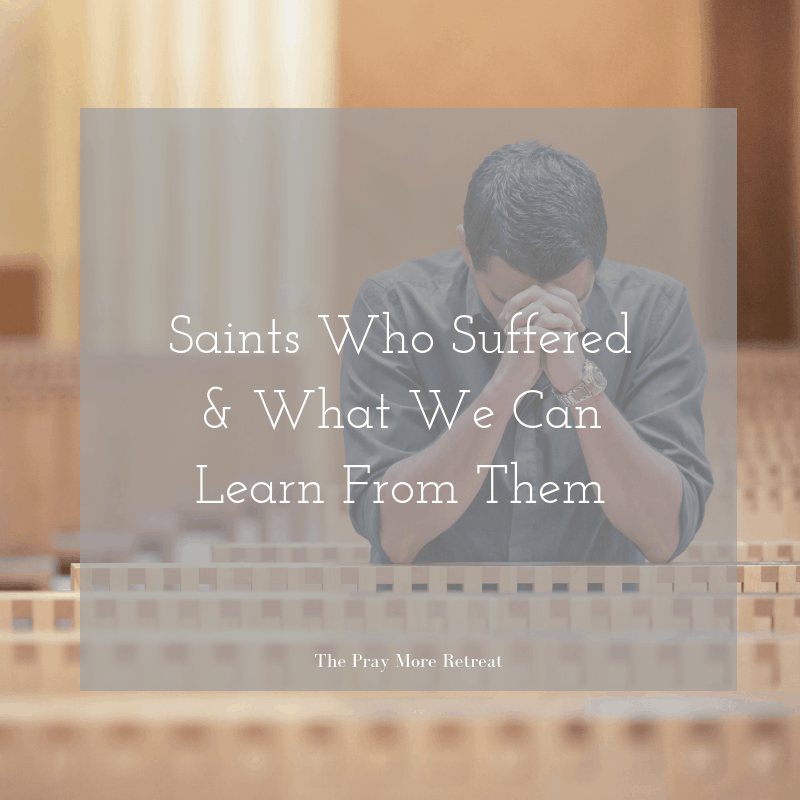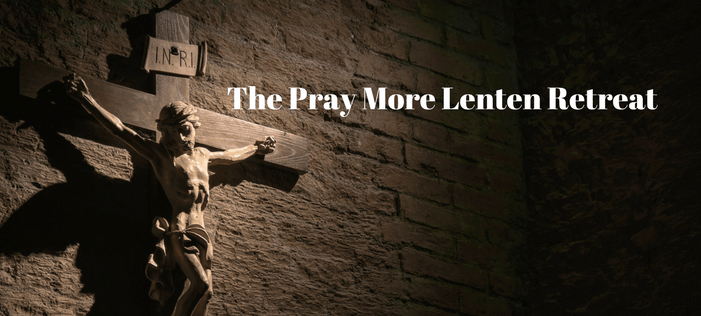Summary
In this talk, Jon talks about how we can learn from the lives of the saints who suffered and offered their lives to the Lord. He gives examples and insights on the importance of mortification and trust in God as we face obstacles in our daily lives.
Thank you for watching and participating in this retreat!
Not Registered, yet? Don’t miss the rest of the talks! Register for the Pray More Retreat!
Downloads
Audio MP3
Click here to download audio file.
Printable Study Guide PDF
Click here to download the printable study guide.
Printable Transcript PDF
Click here to download transcript of the video presentation.
“No one has greater love than this, to lay down one’s life for one’s friends.”
John 15:13
Reflective Study Guide Questions
- Jon mentioned several saints who suffered greatly during their lives. What saint do you feel most connected to or inspired by? How did they handle suffering in their life? Why do you find them to be inspiring?
- When you face suffering of any kind whether it be spiritual, physical or otherwise, it’s important to get help from a counselor, spiritual director or trusted family member or friend. As the saints show us through their lives, you don’t have to be alone. If you are facing suffering during Lent, make it a priority to find someone who can support you through the difficult times.
- Often times, especially in today’s secular culture, Catholic’s find themselves battling other people and going against the crowd on many issues in life. In a lot of ways that’s what Christianity is; going against the crowd. What do the saints, like St. Theresa of Avila, teach who went against the crowd teach us?
- Has there been a time in your life when you think that you can be the savior? That is, when you are facing suffering have you ever thought, “It’s up to me to make things better”? If so, you’re not alone. We have all thought that it’s up to us and that by our own effort we can make everything the way it should be. But, we aren’t the savior, Jesus is the savior. In looking at the lives of the saints, we learn from them how to let God be the savior. The saints did not see suffering as obstacles. The saints saw suffering as opportunities for holiness. What is important is to never give up while suffering and to always keep God at the center. So, the next time you face suffering, whether it be big or small, challenge yourself to offer it to God as the saints did.
Text: Saints Who Suffered & What We Can Learn From Them
Hey everybody, Jon Leonetti here. Alright, this talk is entitled “Saints who suffered,” and what it is that you and I can learn from them. And there is a lot. I’m going to give some specific saints and things that they suffered with in a few minutes, but first I want to talk about the martyrs. You talk about saints who suffered, anyone in heaven is a saint. And there’s no greater love than this, than to lay down one’s life for a friend. Who’s the ultimate friend but God? The martyrs teach us something incredible. I want to talk about some of the early martyrs, specifically the apostles. Remember, 11 of the first 12 apostles were martyred.
St. Peter
Let’s talk about the first Pope, St. Peter. Legend has it – we know he died for the faith – but legend has it that he was crucified. And as he was being crucified he asked to be turned upside down, because he said he wasn’t worthy to die the way that our Lord died. When you look at Peter’s life, you look at a life that you are constantly… you kind of find this guy here that’s, you know, kind of got the old devil on one shoulder and angel on the other shoulder sort of cartoon. You know, “Do I do this, or do I do that?” And oftentimes we know Peter messed up, in fact in some very real ways. He denied our Lord three times. Imagine a pope denying our Lord three times. He was constantly in this mental battle. And this is a sort of suffering, I think, for a lot of us – he was constantly questioning, he was doubting, he was, you know, not trusting. And he’s walking out on the water, he’s trusting the Lord, and then all of a sudden he falls, you know, getting reprimanded from our Lord, that “Why did you doubt Me?”
And I think, in a lot of ways, this is kind of what the ordinary Christian, especially today, looks like. You know, you and I are battling in our minds a lot of this doubt, fear, you know, where we just mess up. But here’s what Peter teaches us about that. What Peter teaches me at least is that it’s worth it. There it is, plain and simple. Is that it’s always worth it. That when you fall down, it’s worth it to get back up. When you mess up, it’s worth it to get back up. When you deny our Lord three times, it’s worth it to get back up. And in the end, Peter shows us what that really looks like when he offers his entire self to God as a martyr in the church today. So, there’s kind of the first battle that I think, in lies Peter, the battle that many Christians are going through today.
Death is a Doorway
I think of a martyr by the name of St. Lawrence, what he has to teach us about death. That death isn’t the end, it’s the doorway. St. Lawrence was put on the spindle, and as he was being roasted alive, skin melting off, it’s said that his last words were “Turn me over, I’m done on this side.” You know, here is St. Lawrence dying in a very gruesome way, and he’s mocking his executioners. What does St. Lawrence teach me? It’s that death is not the end. Death is a doorway to the Almighty God. Write that down if you’ve got a pen. Death is not the end. Death is a doorway. In fact, that’s why many saints carried around skulls with them and put them on their desk: to remind them of sister death, as St. Francis called it. To remind them that death is that doorway for which they gain eternal life with God.
Offer it Up
I think of St. Bartholomew. St. Bartholomew was flayed alive, and one of my favorite places to go in Rome is to stand before his giant marble statue. And he’s got his arms outstretched, and across draped over his arms is his skin as a sort of offering to God. What do we learn from St. Bartholomew here as a martyr? We learn that all of our lives, no matter what, has to constantly be that offering to God. You know, you’ve heard it said before: “Offer it up.” Do you? You know, just because it’s something that we’ve heard over and over again, just because, you know, maybe some people think it’s tired doesn’t mean that it’s any less worth it, especially now more than ever.
You know, here is Bartholomew offering his very self, here’s his skin that he’s offering. And, most likely, you and I that are watching this, or you watching this right now, most likely you’re not going to have to do that. But what does St. Bartholomew teach us in that most real, the biggest of ways, by giving his entire life? Is that everything can be offered to God. Everything that you have, every little annoyance, every occurrence in your life that maybe doesn’t go your way. The person that cuts you off in traffic can be an offering to God for their souls. The person that’s maybe taking the Lord’s name in vain in front of you. I talked to a person the other day that said that she has a dear friend, that every time she hears someone take our Lord’s name in vain that she just offers a little prayer for the conversion of their soul there. You know, that’s a beautiful offering to our God. St. Bartholomew teaches us, especially in the most important case – our entire lives – what it means to offer ourselves, to offer it up to Almighty God.
St. Sebastian
So I think of the martyrs. And on down the line we could go over martyr after martyr. I mean, St. Sebastian was… they tried to kill him by arrows, but he didn’t die there. In fact, he went back to the person that tried to kill him and still tried to convert him, and the person sent his guards out and then clubbed him to death. What was he most worried about? The soul of the other person. You know, if you and I, people tried to kill us and they didn’t succeed, you and I would run in the opposite direction. That wasn’t Sebastian. He was so concerned with souls, he was so concerned with different souls turning their life over to Jesus Christ, that that’s what he wanted done. That’s what was most important to him.
Again, we could go on down the line with these martyrs and what it is that they teach us. But in a very special way, these martyrs, these saints teach me: A. What’s most important. B. That it’s worth it. C. That we’ve got to persevere, and that’s what I’m going to talk about next with St. Mother Teresa of Calcutta. Now, I know I’m going from one end of the spectrum to the other here – you know, we’re going now to St. Teresa of Calcutta – but we talk about perseverance, that fits in perfectly with what we were talking about with these early saints.
Perseverance
How did Mother Teresa persevere? Many of us know she experienced a darkness. And this wasn’t known really throughout her life – her spiritual director and probably even a couple of people knew. But after her writings came out, which have been very beautifully put together in Come Be My Light, which is the book that articulates all of those, we know the spiritual anguish that she suffered, in many cases doubting, in many cases not knowing if she could go on. Very real. She went through this with her spiritual director, who was helping her along the way. But Mother Teresa teaches us all something: That it’s important to persevere.
Now, I know you and I aren’t probably experiencing the dark night of the soul. In fact, there’s only probably a couple of handfuls of people that have while they’re living. But I think all of us can relate to some sort of spiritual darkness that oftentimes maybe we go through. Maybe it’s just in a way where I just don’t feel like being holy today. I just don’t feel the connection with God. I just don’t feel God in this retreat, or this moment, or my day. That’s fine. But what the saints teach us is it’s not about feeling. What the saints teach us is, is we must always persevere, even in the darkness. That Christ Jesus will be our light. To persevere, St. Teresa of Calcutta teaches me. And I know I’m just kind of going up and down the board, but that’s fine.
It’s Important to do Battle
Now, some people may suffer in a way that’s not mental, in a way that’s not physical, in a way that’s not necessarily spiritual. But they may suffer from a selfinflicted suffering. I’m thinking here of Venerable Matt Talbot. Venerable Matt Talbot was an alcoholic who drank excessively for almost 20 years. He quit drinking, but for the rest of his life that desire to drink never left him. For the rest of his life he battled that.
Here’s what Venerable Matt Talbot teaches me: It’s important to do battle. It’s important to do battle with sin. It’s important because it’s worth it, and that God is there amidst that battle, amidst that fight. And that, again, that He’s not going to leave us alone in this. And that’s what Venerable Matt Talbot always consistently leaned on, is he didn’t trust in himself, he trusted in God. Amidst those sufferings that he went through, amidst that desire to drink, who did he place his trust in? Who did he give his life to but God?
Who are we trusting? Are we trying to do this on our own? Are we trying to go through life – and our sufferings, and our battles that you and I and that everyone is going through – are we trying to do this on our own, or are we doing this with other people and with God? And that’s the beautiful thing I love about the saints, especially Venerable Matt Talbot’s stories. He wasn’t afraid to get help. So maybe you’re going through a battle like that right now. What does Venerable Matt teach us? He teaches us, number one, it’s important to get help. Finding a good counsellor, someone that can keep you accountable, a good spiritual director as well. That’s probably the biggest thing, because you don’t have to be alone in this. You don’t.
Trust In The Lord
You look at the different saints on down the line. Some suffered at the hands of other people. You look at St. Teresa of Ávila. You know, she’s famous for saying to the Lord in prayer “If this is how You treat Your friends, no wonder You have so few.” Talk about the ultimate burn right there, right. And she was dealing with cleaning up her order. She was dealing with resistance from different people, even her friends that were trying to get in her way. Maybe that’s the case right now in your life. Maybe you’re battling just other people, and you feel like you’re just kind of going against the crowd on a regular basis. And in a lot of ways, that’s what Christianity is.
What’s the beautiful thing they teach us? First of all, humor – if you look at St. Teresa of Ávila’s life, she didn’t take herself too seriously in this. But ultimately, to trust in the Lord. That it’s His. That it’s His mess, that it’s His problem. You know, St. John the 23rd is famous for going to bed at night and saying “Lord, this is Your church. I’m going to bed. You do what it is that You need to do.” You see, sometimes, friends, we think we can be the savior, but we’re not. We have to be reminded over and over again that it’s Christ Jesus that’s the savior, not you and I. And that’s what we see in the life in the saints, especially with suffering.
Suffering is Not an Obstacle
Write this down: The saints did not see sufferings as obstacles. The saints saw suffering as opportunities for holiness. I’m going to say that again, because I think it’s important. The saints did not see sufferings as obstacles to their relationship with God, but they saw their sufferings, whatever they were, as opportunities. They didn’t go out looking for it, just like you and hopefully don’t. We’re not masochists. But suffering comes in all of our life in all of the different forms. In some ways, we’ll never understand why. But it’s important always to remember to persevere, to remember what’s most important, to never give up amongst it and, most importantly, to keep God at the center. That’s who we are as Christians. Thanks for listening friends. Jon Leonetti, talk to you soon.
About Jon Leonetti

Jon Leonetti is a nationally known Catholic speaker, best-selling author and radio host who conveys a message of lasting fulfillment in Jesus Christ. Through Jon’s keynote presentations and parish missions, thousands of Catholics each year discover the freedom Christ offers by way of his life and love. Jon’s the author of three books: Mission Of The Family, Your God Is Too Boring and, The Art of Getting Over Yourself: And Why You’ll Be Happier When You Do. Jon’s first two books are published and featured in Matthew Kelly’s Dynamic Catholic Book Program. Jon’s writings and talks have been endorsed by Archbishop Joseph E. Kurtz, New York Times Bestselling author Immaculee Ilibagiza, Mark Hart, Chris Stefanick, Brandon Vogt and more.
Jon believes that our deepest longing for happiness and wholeness is fulfilled in the encounter with Jesus Christ. Through prayer, the Sacraments, family life, and the help of Mary and the saints, Jon wants to cultivate an intimate relationship with Jesus, and help others do the same. With this message Jon has been featured and interviewed by the nations top Catholic websites, blogs and radio shows, helping Catholics in all walks of life to fall in love and stay in love with the living God. At home, Jon enjoys reading, sports, exercising, coffee and, most of all, spending time with his wife Teresa and their children Joseph and Gianna. Jon has a masters degree in moral theology.

